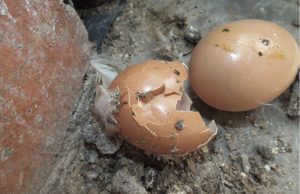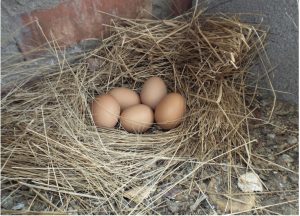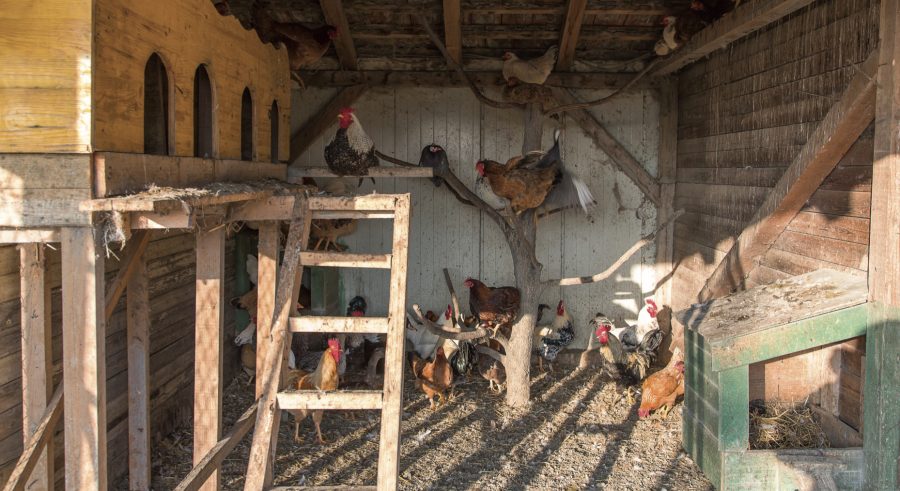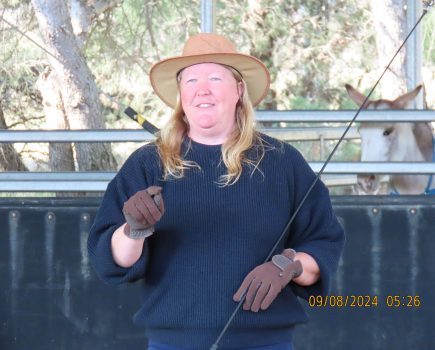Many bad habits hens display can easily be remedied. Paul Donovan investigates the unsavoury one of hens eating their own eggs.
Sherlock Holmes was a fictional sleuth created by the British author, Arthur Conan Doyle in 1887. Sometimes, we need to don our deerstalker hat like Holmes wore, to solve crimes committed by our birds.
As intelligent as chickens are, they do have some unsavoury habits, and one of them is egg eating. I am sure this habit is something most of us have experienced during our time keeping poultry. It is, as the name implies, where one or more birds will break their eggs and eat the contents. But why?
BEHAVIOURAL PROBLEMS
When you analyse behavioural problems, most can be attributed to boredom, or the lack of mental stimulation which, are often our own making. As i have mentioned, chickens are bright birds and need to be kept active.
While egg eating can occur at any time of the year, it is more prevalent during the winter months when the birds are shut in, and the days are short. Lengthening the day by installing a light in the coop can reduce the chances of egg damage. As can providing enrichment. Suffice to say, give them something to do, and they won’t go looking for something to do.
NUTRITIONAL PROBLEMS
One area where egg eating has been implicated, relates to diet; particularly imbalances in calcium and protein. In most cases, where a proper commercial diet is being fed, deficiencies shouldn’t be of concern. This is one of the reasons why it is wise to pay a bit more for a quality brand of layers mash. Cheap brands are cheap for a reason.
The problem arises when you begin to ‘dilute’ the feed with kitchen scraps or other ‘supplements’. Or, even begin mixing a cheaper feed in with the more expensive feed to make it go further.
I have watched people on YouTube advise feeding egg shells to their hens if they are laying soft-shelled eggs. This is to supplement any calcium deficiency they are suffering from. That is such a bad idea, or habit to get into. The hens will eventually put two and two together, and associate
the eggshells with the eggs, and begin cracking their own eggs open. If your hens are laying soft-shelled eggs and you deem supplementing necessary, it is better to use something such as Oyster shell, or even grate cuttlebone onto the feed.
There is some evidence to support the belief that the lack of vitamin D3 can cause the birds to begin eating their own eggs; Vitamin D3 is not produced by the body, but synthesised in the skin through sunlight. Bear in mind, that even if the birds have access to long periods of natural sunlight, the thick layer of feathers they have provides a dense barrier through which sunlight has difficulty penetrating.
The amount of skin exposed to the sun is limited to service all the hen’s needs. This is why almost all of the birds’ D3 requirements are obtained directly from the diet. That being said, access to natural sunlight is beneficial.
If egg eating problems relating to D3 deficiency are to be seen, it is more likely to occur during the winter months, when the birds are shut in for long periods of time. It is important during this period, to ensure the mash they are being fed has sufficient D3 additives. A supplement can also be used, if deemed necessary.
PESTS IN THE NEST
If you do not keep nest boxes clean, they can become a haven for parasites such mites and ticks. These will begin to irritate the hens, which will begin to look for other places to lay. If they cannot find anywhere suitable, they will just lay the eggs anywhere. And laying them on a hard surface with many clumsy feet around, is an accident waiting to happen. So, replace bedding regularly.
 FINDING THE CULPRIT(S)
FINDING THE CULPRIT(S)
The difficult part of egg eating behaviour, is finding the culprit, as the first sign of the behaviour are broken eggs all over the place. Unless you physically catch the culprit in the act, it is very difficult to point the finger at any one particular individual. Unfortunately, as chickens are bright birds, they have the habit of what one does, most will follow suite. So there could be more than one culprit.
Before I go any further, I must point out, do not always assume it is the hens which are perpetrating this crime. If you keep a cockerel amongst the flock, he is just as likely to be the culprit, as the hens are.
WHAT DO I DO?
Depending on whether one or more individuals are involved, remedial action can vary. If more than one individual is involved, they should all be treated together.
The first solution many people turn to, is to cull the offending individual(s). This is quite a drastic action to take, bearing
in mind the reason why the behaviour
is taking place, could be down to your inability to provide them with some very basic husbandry requirements. Chickens are quite intelligent birds, and can usually be shown the error of their ways without having to go down that path. Fortunately, many ways we can solve this behaviour, are simple to initiate.
I had one hen which started egg eating, and I identified the problem was her scratching the flooring away to lay her eggs in the depression she created; even though there were ample nesting boxes to go around. When laid on the exposed ground, they were vulnerable to being broken. The solution to this was quite simple.
I isolated the culprit to the coop where i removed all flooring. Other than a perch for roosting, the only addition were two nesting boxes lined with hay, and partially covered with shade cloth. In addition, i placed a thin layer of dense foam underneath the hay. Should she decide to scratch away the hay, she would find the foam.
For the first few days, she continued to go through the process of scratching at the floor, even though there was nothing to scratch at, and laid her egg on the bare floor. Eventually she became inquisitive, and i found her in one of the nest boxes.
I left her on her own for two weeks. Each day I would remove the egg, and over the coming days, she continued to lay in the nest box. Interestingly, she had made no attempt to scratch out the nesting material, but just moulded it into a depression.
That cured the problem, because when I returned her to the main coop, she would only lay in the nest box. Just to be on the safe side, I also made the nesting area darker and smaller, so as to give them a more secure feel, and reduced the depth of floor covering in the coop. Rather bizarrely, since modifying the nesting boxes, all the hens lay their eggs in the same nest box, and then one female tries to incubate all the eggs.
 MAKE THEM DISTASTEFUL
MAKE THEM DISTASTEFUL
Another way of trying to solve the problem, is to make the eggs distasteful. In situations where i have had several hens break eggs, I have tried the time honoured approach, of filling an egg with mustard. That hasn’t worked. I’ve filled them with hot curry powder. That hasn’t worked. I have tried filling them with mashed up onions. That’s right, that hasn’t worked either. What I discovered did work, was to blow a couple of eggs, and then fill them with a mix of egg yolk, vinegar and chilly powder. I also sprinkled this mix ever the outside of the egg. If hens could pull a sour face, mine would have. Over a few days, i would move the eggs around the coop, and it cured the problem. The moral here, is if one thing doesn’t work, just keep trying different things. All birds are different.
PREVENTION IS BETTER THAN CURE
If we provide the correct husbandry for our birds, and keep them mentally stimulated, behavioural problems seldom arise. It is when something is lacking, or something which we do (or don’t do) that problems begin to show. Here are ten things you can do to try and prevent egg eating occurring.
1) Provide adequate nest boxes which the hens feel secure to lay in. As I have found, you may find they prefer one over all the others, so all the hens end up laying in one favourite one. Since I experienced my egg eating problem, i have revamped the hen house. One addition i made, was to suspended a tyre from the ceiling. For some peculiar reason, all my hens have now decided to lay in this. And one particular hen then sits on all the eggs.
2) Place nesting boxes in a darkened area, or partially cover the entrance with a cloth; I use 60% shade netting. This will give the birds a sense of security.
3) Line the nesting boxes with a sufficient depth of litter/hay, and keep it fresh. If it becomes a hotbed for parasites, the hens will start to look elsewhere to lay.
4) Avoid over-crowding. This reduces the chances of eggs being trodden on and broken.
5) Eliminate stress. Boisterous cats, dogs and young children chasing birds around can create a stressful environment for the chickens. And
of course eliminate the possibility of pests getting into the hen house/coop.
6) Ensure the hens have a balanced diet. If you are finding eggs with brittle shells, and need to supplement with a calcium, use oyster shell, or grated cuttlebone, rather than crushed egg shell.
7) Get into the routine of removing eggs early in the morning – this limits any chances of the chickens breaking them. I have got into the habit, of removing eggs whenever I find them.
8) Clean up broken eggs as soon as they are seen. This will prevent the chickens getting a taste for them.
9) Try and eliminate boredom. Stimulate your chickens by giving them something to do, even if that’s just throwing a handful of corn on the floor for them to forage for, or hanging some greens from the roof for them to peck at.
10) During the winter when daylight hours are short, install a light in the coop; even if it’s only a low powered night light. There is quite a bit of evidence showing that, chickens can suffer the same psychological effects of Seasonal affected disorder (SAD) as much as we can.
11) Logic really should tell you not feed eggs, even cooked ones, to your chickens.
TAIL-END
Even though i give my hens the best possible environment to live in, I have still experienced problems with egg eating. Interestingly, i came across a piece of research which suggested that ‘putting
a dish of milk in with the hens for a few days, supresses their desire to eat their eggs’. This seems to suggest that there
is a relationship between egg eating, and calcium/protein deficiency but, providing that you feed a balanced diet, in theory, this deficiency should not occur.
In my experience, and from others I have spoken too, egg eating seems to be more prevalent in chickens kept in cramped conditions – which is not really that surprising. It is less likely to occur in free-range birds, which have the freedom of movement, and therefore more activity to keep them stimulated. If we can provide our birds with space, a good balanced diet, and good husbandry, behaviours such as egg eating should not be prevalent.
At the end of the day, many of these behaviours are often of our own making, and so we should not place them squarely at the feet of our birds. We need to take responsibility for our own doing.
Read more from Paul Donovan here
To receive regular copies of The Country Smallholder magazine featuring more articles like this, subscribe here.
For FREE updates from the world of smallholding, sign up for The Country Smallholder newsletter here.








